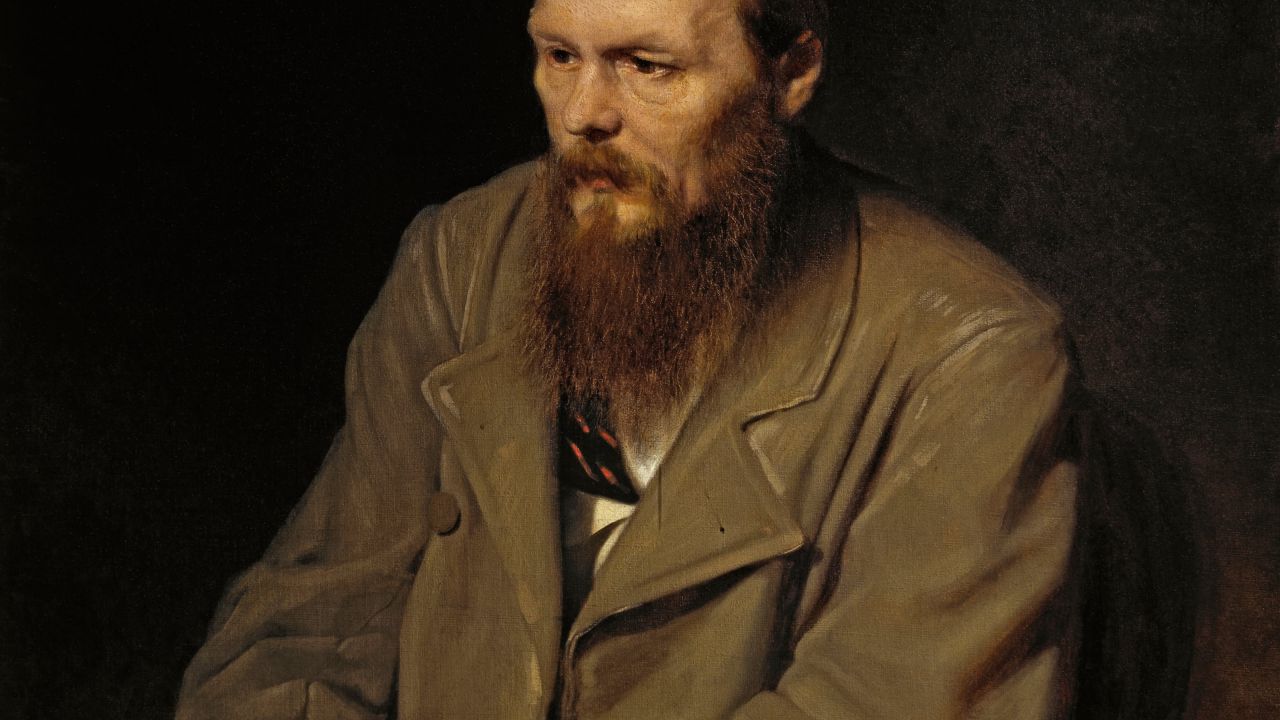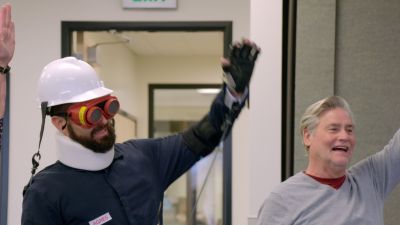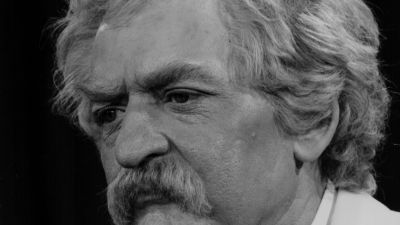
Portrait by Vasily Perov. (Wikimedia Commons/Public Domain)
This post first appeared at the Paris Review.
I
A Few Facts
1. He wore 5-pound shackles on his ankles every day for four years.
2. This was in the prison camp in Omsk where he was serving out a sentence of hard labor after being convicted of sedition for being part of a revolutionary cell dedicated to the liberation of the serfs and freedom of the press.
3. For the seven months following his arrest, he’d been kept in solitary confinement in the Peter and Paul Fortress on the Neva, his cell window smeared with an oily paste to prevent any daylight from seeping through.
4. One morning he was suddenly taken to Semyonov Square, where he was given a white death-shirt to put on and allowed to kiss the cross. He was sixth in line for execution, with only minutes left to live, when the announcement came that the Czar had decided to spare the prisoners’ lives. Apparently this had been planned all along.
5. On the way to the prison camp, they stopped for the night in Tobolsk where a town bell had been sent into exile, convicted of ringing for seditious purposes. Its sentence was eternal silence.
6. In Tobolsk, he met a man who was chained to the wall. He had been chained there for eight years. The chain was 7 feet long and extended from his sleeping pallet to the opposite wall. The man spent every day walking from the pallet to the wall and back. He said he didn’t mind. He showed where the chain attached to his underclothes, and the most comfortable way to lie down on the sleeping pallet. When he spoke, his voice was mild with a slight lisp. He said he had once been a government official.
7. It was in Omsk that the epileptic seizures began. They came mostly once or twice a month. Sometimes, though rarely, twice a day. They could lie dormant for as long as four months. After each seizure something in him grieved. Words blackened or grew muffled for days, sometimes a week, their distant contours alien and heavy. He tried but couldn’t lift them.
8. He wasn’t allowed a single book for almost four years. Except the Bible.
9. “Awkward, immobile, silent … his pale, thin, earthen-colored face covered in dark red spots,”a young prison guard described him years later.
10. “I look at their pale faces, at their poor beds, at all of this impassable nakedness and poverty — I peer in — and it is as if I want to make sure that it is not the continuation of a disfigured dream, but actual truth. But it is truth: I hear someone’s groan, someone throws out his hands heavily and clangs his chains,” he would remember in The House of the Dead.
11. After 10 years he was released. “These are the notes of an unknown,” he wrote in a letter to his brother.
12. He gambled compulsively in Petersburg and Europe until one day he didn’t.
13. Frail, epileptic and defying building regulations, in the Basel Museum he dragged a chair in front of Holbein’s Dead Christ, and then — to his wife’s horror — climbed up on it so he could stand face to face with the brutalized, blue-green corpse with open eyes and rigid, open mouth — this executed man on the verge of decomposing. He would place this corpse in his new novel, The Idiot.
14. Sofia, his beloved first child, was born in Geneva during the writing of The Idiot, and died abruptly three months later of an inflammation of the lungs. He didn’t see how he could ever love another.
15. With book after book, the critics labeled his work too fantastical, cruel, exaggerated, morbid. “All they demand is a narrow utilitarianism,” he wrote to Turgenev, “Poetic truth is viewed as wild raving.’”
16. “The soul of another is a dark place,” Prince Myshkin thinks to himself as he walks in his own darkness in The Idiot, “and what chaos is found there.”
17. In a letter from Geneva to his friend Apollon Makov in Petersburg, he set forth his position: “Oh my friend, I have my own special view of reality (in art) and what the majority call almost fantastic and exceptional sometimes constitutes the very essence of the real … In every newspaper you come across reports of the most real facts and the most odd … but they are reality because they are facts. They occur every moment and they are not exceptional.”
18. Facts are “irrefutable, terrible, disfigured, implacable.”
19. In what ways are the “terrible and disfigured” also beautiful? His books ponder this question.
20. In all those years in the prison camp, he spent no more than a few seconds alone. Barely held a pen or pencil except for the brief times he was hospitalized and Dr. Troitsky slipped him a sheet of paper and a pencil. So many mornings and nights in a barracks where hundreds of beetles crawled across the floor, as gradually he came to feel close to others who at first seemed opaque, alien threatening.
II
One Night in a Room
Dostoyevsky’s books enact a radical empathy. Amid ugliness, strife, distortion, mutilation, a hand reaches as through flame to stroke the anguished face of another. A man asks himself in the cold of winter, “If the rich have so much money, why must there be a freezing baby?”
So little stays unruined.
In The Idiot, through one night and into morning, Prince Myshkin holds and strokes the murderer Rogozhin. Nearby them in the bed, Nastasya’s dead body. Long hours of dark, then the window faintly lightens. Myshkin trembles, at times he can’t move his legs, but he doesn’t pull back.
Now and then Rogozhin sometimes suddenly began to mutter, loudly, abruptly, incoherently; began to exclaim and laugh; then the prince would reach out his trembling hand to him and quietly touch his head, his hair, stroke it and stroke his cheeks…
And:
Meanwhile it had grown quite light; he finally lay down on the pillows, as if quite strengthless now and in despair, and pressed his face to the pale, motionless face of Rogozhin; tears flowed from his eyes onto Rogozhin’s cheeks, but perhaps by then he no longer felt his own tears and knew nothing about them…
By the time the police arrive in the morning, Myshkin’s eyes are glassy and he can’t speak. It seems he will never speak again.
Everyone believes he’s become an “idiot” again — his night with Rogozhin rekindling the epileptic state where he neither understands nor articulates nor exercises judgment — nothing to be done for it but to send him back to the sanitarium in Switzerland.
But everything they think is just conjecture. No one can see inside his mind. The only fact that can truly be known is that he stayed with the murderer, stroked him, trembled, wept. Held close in mysterious, unspeakable empathy the suffering, delirious body and mind of another.
III
Darovoe
When he was nine, Dostoyevsky’s family bought a small country house in Darovoe. It was there that one day a peasant man, Marei, reached out and gently stroked the boy’s face. In prison, Dostoyevsky later said, “the memory came back to me and helped me survive.”
IV
Epilepsy
“A person does not always look like himself,” Dostoyevsky writes of sitting for his portrait by Vasily Perov.
Such a calm statement. But in his notebooks he keeps track of his seizures as time, space, language, stability, intention break in him over and over. The world breaks over and over.
And there is the aura before:
Suddenly amid the sadness, spiritual darkness and depression, his brain seemed to catch fire … His mind and heart were flooded with a dazzling light. All his agitation, doubts, worries, seemed composed in a twinkling, culminating in a great calm and understanding…
And:
As if you suddenly sense the whole of nature and suddenly say: yes … this is not tenderheartedness, but simply joy … what’s most frightening is that it’s so terribly clear, and there’s such joy. If it were to last longer than five seconds — the soul could not endure it and would vanish.
But:
[T]hese moments, these glimmerings, were still but a premonition of that final second with which the seizure itself began, that second was, of course, unbearable.
Between 1860 and 1881, he suffered at least 102 seizures, most likely more.
Built into the workings of his nervous system, that strange radiance inseparable from devastation, that joy and calm that vanish into shame and damage.
The radiant shattering leads to an empathy so radical it’s seen as grotesque, fantastical, ugly.
A hand returned to its own ignorance and mystery reaches to give comfort to another.
V
Cruelty
In 1882, the influential critic N.K. Mikhailovsky published his derogatory book-length essay Dostoevsky: A Cruel Talent.
“He forces his characters to commit bizarre, fantastic crimes, or at least to entertain the same sort of idea, so that they might suffer, suffer, suffer.”
“All of Dostoevsky’s politics and publicistics is continuous vacillation and confusion, in which there is, however, one independent, original trait: unnecessary, causeless, resultless cruelty.”
VI
Myshkin
Oh, I only don’t know how to say it … but there are so many things at every step that are so beautiful, that even the most confused person finds beautiful. Look at a child, look at God’s sunrise, look at the grass growing, look into the eyes that are looking at you and love you …
*
After a series of strong and painful fits of my illness, though my mind worked, the logical flow of thought was as if broken …I was completely awakened from that darkness, I remember … and what roused me was the braying of a donkey in the town market … For some reason I took an extraordinary liking to it, and at the same time it was as if everything cleared up in my head … I began inquiring about donkeys because I’d never seen them before, and I became convinced at once that they’re most useful animals, hardworking, strong, patient, cheap, enduring … my former sadness went away entirely.
*
You know, in my opinion it’s sometimes even good to be ridiculous, if not better: We can the sooner forgive each other, the sooner humble ourselves; we can’t understand everything at once … one must first begin by not understanding many things! And if we understand too quickly, we may not understand well.
VII
Now
I didn’t know that empathy has been a word in English only since 1909. It’s derived from the German Einfuhlung: “feeling into,” which was coined by Robert Vischer, the author of On the Optical Sense of Form: a Contribution to Aesthetics, 1873. In 1909, Edward Titchener, an American psychologist, translated Einfuhlung into empathy.
Mirror neurons are neurons that fire both when an animal acts and when it observes the same action performed by another. They were first identified in the 1990s by a team of neurophysiologists in Parma who placed electrodes in the ventral premotor cortexes of macaque monkeys.
Marco Iacobini, a neuroscientist associated with UCLA, argues that mirror neurons are “the neural basis of the human capacity for empathy.”
Dostoyevsky experienced more than one hundred major seizures, walked in chains and prison garb, wasn’t permitted to hold a pen or pencil for nearly four years or read any book but one. He watched two children die and wrote several times of a man’s inner life in the minutes and seconds before execution. He had Myshkin think about a donkey’s goodness and importance, and led him to the room where he would stroke and soothe Rogozhin.
His books offer the words to feel into pursued to their radical end, embodied. To feel into — which doesn’t mean to understand, or analyze, or interpret, or heal. Doesn’t mean to solve, define, make steady, claim knowledge of, but has something to do with drawing close, with how there’s a radiance more mysterious, more unspeakable than horror; more private in its wounds, more lasting.




